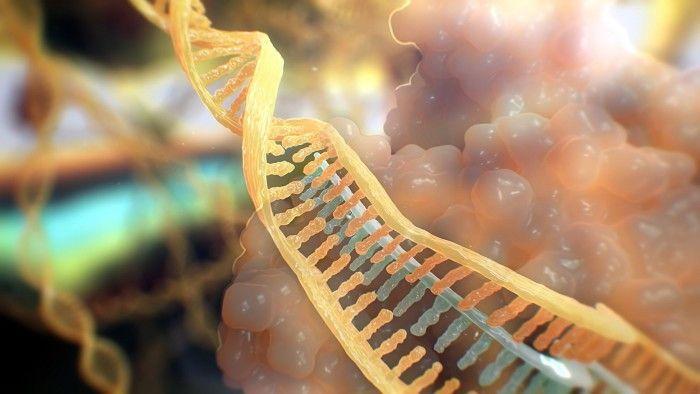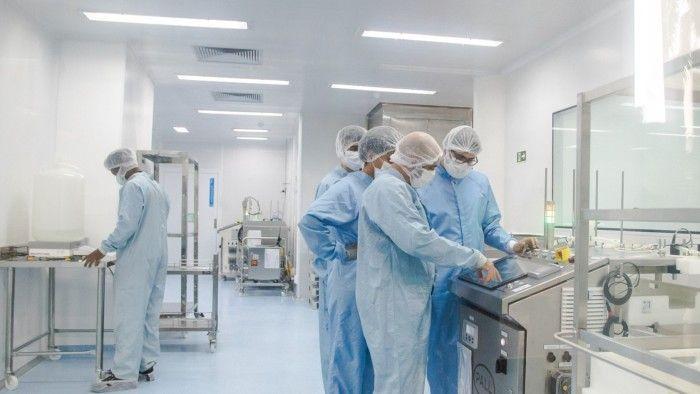AstraZeneca's $555 Million AI-Powered Gene-Editing Deal with Algen Biotechnologies
2 Sources
2 Sources
[1]
AstraZeneca signs $555mn AI deal to develop gene-editing therapies
AstraZeneca has signed a $555mn deal with a San Francisco-based biotech business that specialises in artificial intelligence -- the latest pharmaceutical company to seek an AI partner for drug development. The agreement with Algen Biotechnologies gives AstraZeneca exclusive rights to develop and commercialise therapies from the gene-editing technology known as Crispr. Algen was spun out of the Berkeley lab where Jennifer Doudna developed the technology, for which she won the Nobel Prize for chemistry in 2020. Doudna is an adviser to Algen. Algen will receive up to $555mn for hitting regulatory and commercial milestones in collaboration with AstraZeneca, which is not taking an equity stake. It has previously raised $11mn and received a $350,000 grant from the National Institutes of Health in 2021 for cancer research. While AI has the potential to speed up successful drug testing, there are few AI-discovered drugs in late-stage clinical trials, and not one has been approved. Meanwhile, the amount of cash flooding into all AI investments is seen by many as a bubble. With AI, "I think we are definitely in a period of hype at the moment," Jim Weatherall, AstraZeneca's chief data scientist, said. "Today, I think our way of controlling the hype is to carefully introduce AI as a tool" for the company's scientists, he added. "To be sure, [AI] is no magic bullet for drug development. While sometimes it is overhyped, you don't want to downplay it either because the potential of this technology is huge." New AI tools are increasingly sought by big pharma companies to save on costs and time. In 2023, Roche partnered with Nvidia to work on drug development. AstraZeneca in 2019 started a collaboration with BenevolentAI for lung and kidney diseases. But UK-based Benevolent's shares plunged more than 99 per cent before it delisted in March. AstraZeneca says it still has a partnership with Benevolent. Algen, which has previously applied machine learning to oncology treatments, will be working for AstraZeneca on immune system diseases. "We are not just analysing data using AI," said Chun-Hao Huang, Algen's co-founder. Rather, AI and Crispr are being paired together to generate solutions, he said. New drugs fail up to 90 per cent of the time when they reach clinical trials. For AI to be successful, pharmaceutical companies need to do a better job at benchmarking how the technology is performing versus conventional methods, said Alex Zhavoronkov, chief executive of AI for drug discovery company Insilico. For now, "the role of the pharma industry in AI is very limited when it comes to early stage drug discovery," he said.
[2]
AstraZeneca signs USD555 million AI gene-editing deal - FT
(Alliance News) - AstraZeneca PLC has signed a USD555 million deal with San Francisco-based Algen Biotechnologies to develop gene-editing therapies using artificial intelligence, the Financial Times reported on Monday. The Cambridge, England-based pharmaceutical company will gain exclusive rights to develop and commercialise treatments from Algen's Crispr-based gene-editing platform. Algen, a spinout from Jennifer Doudna's Berkeley lab - where the gene-editing technology known as Crispr - will receive milestone payments of up to USD555 million. Doudna, who won the Nobel Prize for chemistry in 2020, serves as an adviser to Algen. AstraZeneca's chief data scientist Jim Weatherall said that while AI's potential in drug discovery is "huge", the company is carefully introducing it "as a tool" amid what he described as a "period of hype." The collaboration marks AstraZeneca's latest move into AI-led research, following previous partnerships with companies such as BenevolentAI. Algen will work with AstraZeneca on developing immune system disease therapies, pairing AI and Crispr to accelerate new drug discovery. Shares in AstraZeneca were up 0.6% at 12,728.69 pence in London on Monday morning. Comments and questions to [email protected] Copyright 2025 Alliance News Ltd. All Rights Reserved.
Share
Share
Copy Link
AstraZeneca signs a $555 million deal with Algen Biotechnologies to develop AI-driven gene-editing therapies, marking a significant step in the pharmaceutical industry's adoption of AI for drug discovery.

AstraZeneca's Strategic Move into AI-Powered Drug Discovery
AstraZeneca, the Cambridge-based pharmaceutical giant, has made a significant leap into the world of artificial intelligence and gene editing by signing a $555 million deal with San Francisco-based Algen Biotechnologies
1
. This partnership marks a crucial step in the pharmaceutical industry's ongoing efforts to harness AI for drug development and showcases the growing trend of big pharma companies seeking AI partners to streamline their research processes.The Deal: Combining AI and CRISPR Technology
The agreement grants AstraZeneca exclusive rights to develop and commercialize therapies using Algen's gene-editing technology known as CRISPR
2
. Algen, a spinout from the Berkeley lab of Nobel laureate Jennifer Doudna, will receive up to $555 million in milestone payments for regulatory and commercial achievements1
. This collaboration aims to pair AI and CRISPR technologies to accelerate the discovery of new drugs, particularly focusing on immune system diseases.AI in Drug Discovery: Potential and Challenges
While the potential of AI in drug discovery is significant, industry experts caution against overhyping its capabilities. Jim Weatherall, AstraZeneca's chief data scientist, acknowledges the current 'period of hype' surrounding AI but emphasizes the company's approach of carefully introducing AI as a tool for their scientists
1
. The pharmaceutical industry faces challenges in benchmarking AI's performance against conventional methods, with up to 90% of new drugs failing in clinical trials.Related Stories
Industry Trends and Previous AI Partnerships
AstraZeneca's deal with Algen is part of a broader industry trend. Other major pharmaceutical companies have also entered into AI partnerships, such as Roche collaborating with Nvidia in 2023
1
. AstraZeneca itself has previous experience in this area, having started a collaboration with BenevolentAI for lung and kidney diseases in 2019. However, the mixed results of some AI partnerships, such as BenevolentAI's recent delisting, highlight the risks and uncertainties in this rapidly evolving field.The Promise of AI-Driven Drug Discovery
Despite the challenges, the potential of AI in drug discovery remains significant. Chun-Hao Huang, Algen's co-founder, emphasizes that their approach goes beyond mere data analysis, instead using AI and CRISPR in tandem to generate solutions
1
. This innovative combination of technologies could potentially reduce the time and cost associated with drug development, addressing one of the pharmaceutical industry's most pressing challenges.As the pharmaceutical industry continues to explore the possibilities of AI-driven drug discovery, partnerships like the one between AstraZeneca and Algen Biotechnologies will be closely watched. The success of this collaboration could pave the way for more AI-powered breakthroughs in medicine and potentially transform the landscape of drug development in the coming years.
References
Summarized by
Navi
[2]
Related Stories
AstraZeneca and CSPC Pharmaceuticals Forge $5.2 Billion AI-Driven Partnership for Chronic Disease Research
13 Jun 2025•Business and Economy

AstraZeneca Partners with Immunai for AI-Driven Cancer Drug Trials
27 Sept 2024

AstraZeneca acquires Modella AI to accelerate oncology drug development with foundation models
14 Jan 2026•Business and Economy

Recent Highlights
1
OpenAI secures $110 billion funding round from Amazon, Nvidia, and SoftBank at $730B valuation
Business and Economy

2
Samsung unveils Galaxy S26 lineup with Privacy Display tech and expanded AI capabilities
Technology

3
Anthropic faces Pentagon ultimatum over AI use in mass surveillance and autonomous weapons
Policy and Regulation





